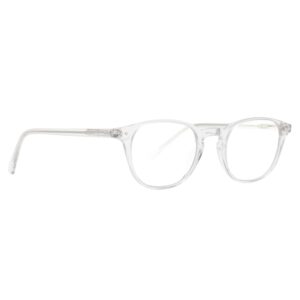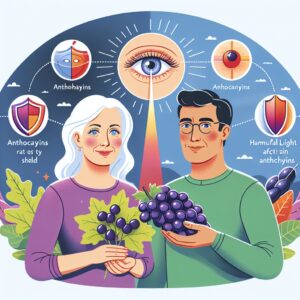
“Vegetables all cut up by Orpheus …” from www.flickr.com and used with no modifications.
- Carotenoids like lutein and zeaxanthin play a crucial role in defending our eyes against harmful blue light.
- Blue light, commonly emitted by screens, can contribute to eye strain and potentially long-term damage.
- While these nutrients are found in green leafy vegetables, supplementation can help those not getting enough from their diet.
- Research suggests that carotenoids can help improve visual performance and protect against age-related eye diseases.
- Choosing the right supplement involves looking at ingredient quality and ensuring proper dosage.
The Science of Carotenoids and Eye Health
Imagine you have a shield, but not just any shield – one that protects your eyes from the invisible slings and arrows of our modern world: blue light. This shield is composed of carotenoids, specifically lutein and zeaxanthin. These are pigments found in plants that not only give them their vibrant colors but also safeguard our eyes by filtering out harmful light rays.
Why are these carotenoids so crucial for our eyes? It’s because they are concentrated in the macula, the part of the eye responsible for high-resolution vision. They act like natural sunglasses, protecting the delicate cells in our eyes from the potential damage caused by blue light. And let’s face it, with the amount of time we spend in front of screens, our eyes are bombarded with blue light more than ever before.
Why Blue Light Matters
Blue light is a type of high-energy visible (HEV) light. It’s everywhere – emitted by the sun, LED lighting, and the screens of our digital devices. While it’s not all bad (it helps regulate our sleep and wake cycles), too much exposure, especially from screens, can lead to eye strain and discomfort. Think of how your eyes feel after a long day staring at your computer or scrolling through your phone. That’s blue light in action.
Daily Screens and Blue Light: A Modern Challenge
Understanding Blue Light Exposure
Most of us spend a significant part of our day in front of screens. Whether it’s working on a computer, texting, or binge-watching our favorite shows, our eyes are getting a constant dose of blue light. This isn’t just an adult problem; kids are getting more screen time than ever before, which means their developing eyes need protection too.
Signs of Excessive Blue Light Strain

“eye strain ibis paint trend by …” from www.deviantart.com and used with no modifications.
How do you know if you’re getting too much blue light? Your eyes will tell you. You might notice them getting tired, red, or irritated. You might experience headaches, or your vision might get blurry after long stretches of screen time. These are signs that it’s time to take action and give your eyes the support they need.
Carotenoids Unpacked: Lutein and Zeaxanthin
What Are Carotenoids?

“Tomatoes, Carrots And Radish On The Top …” from www.pexels.com and used with no modifications.
Carotenoids are the pigments that give fruits and vegetables like carrots, tomatoes, and leafy greens their red, yellow, and orange hues. Out of over 600 carotenoids found in nature, lutein and zeaxanthin are the superheroes when it comes to eye health. They’re not made in the body, so we have to get them from our diet or supplements.
These carotenoids are powerful antioxidants. They help neutralize free radicals, which can damage cells in the body, including those in the eyes. By doing so, they help to maintain the health of the macula and overall eye health.
Now, let’s talk about how you can get these eye protectors into your system and keep your vision sharp and clear.
The Dynamic Duo: How These Antioxidants Work
Lutein and zeaxanthin are like the Batman and Robin for your eyes. They absorb excess light energy, particularly the high-energy rays known as blue light, which can be harmful over time. Their presence in the macula, the central part of the retina, helps to shield your vision cells from damage and maintain the sharpness of your sight.
From Plate to Pill: Carotenoid Supplements for Eye Health

“juice #kale #cucumber #broccoli …” from www.flickr.com and used with no modifications.
While these eye-protecting nutrients are abundant in foods like kale, spinach, and eggs, not everyone eats enough of these foods to reap the benefits. That’s where supplements come in. They’re an easy way to ensure you’re getting enough of these vital nutrients to protect your eyes from the blue light we encounter every day.
When Diet Isn’t Enough
Let’s face it, even with the best intentions, most of us don’t get the recommended servings of fruits and vegetables every day. Busy schedules, food preferences, or limited access to fresh produce can all stand in the way. That’s why supplements can be a game-changer, filling in nutritional gaps to support eye health.
But remember, supplements are just that – a supplement to, not a replacement for, a healthy diet. They work best when used in tandem with a diet rich in colorful fruits and veggies.
Finding the Right Supplement
With so many options on the market, finding the right carotenoid supplement can feel overwhelming. Look for products that specifically list lutein and zeaxanthin on the label. You’ll want to choose a reputable brand that has undergone third-party testing for quality and purity.
Recommended Intake: How Much Is Enough?
So, how much of these carotenoids do you need? The American Optometric Association suggests 10 mg of lutein and 2 mg of zeaxanthin each day for optimal eye health. Check the labels of your supplements to ensure you’re hitting these targets.
Evidence-Based Benefits: What Research Tells Us
It’s not just hype – there’s solid science backing the benefits of lutein and zeaxanthin. Numerous studies have shown that these carotenoids can improve visual performance and may help protect against age-related eye diseases like macular degeneration and cataracts.
Studies on Carotenoids and Vision Protection
One landmark study, the Age-Related Eye Disease Study 2 (AREDS2), found that a combination of lutein and zeaxanthin reduced the risk of progressing to advanced age-related macular degeneration. Another study showed that these nutrients could improve visual acuity and contrast sensitivity.
From Theory to Reality: Success Stories
Take the case of Sarah, a graphic designer who spent hours in front of her computer. She started experiencing eye fatigue and blurry vision. After incorporating a carotenoid supplement into her routine, she noticed a significant improvement in her symptoms. While individual results can vary, stories like Sarah’s are becoming more common as people discover the benefits of these powerful nutrients.
Choosing Wisely: Evaluating Carotenoid Supplements
When it comes to picking a carotenoid supplement, not all products are created equal. It’s essential to do your homework and choose wisely.
Ingredients to Look For

“cod liver oil 2500×1662 – – 1413785 …” from pxhere.com and used with no modifications.
Make sure the supplement you choose has the right ingredients. A quality product will contain both lutein and zeaxanthin, and possibly other beneficial components like omega-3 fatty acids, which can also support eye health.
Quality Assurance: Labels and Certifications
Look for products with labels that show they’ve been tested by independent labs like USP (United States Pharmacopeia) or NSF International. Certifications like these mean the supplement has been vetted for quality and potency, so you can trust what’s on the label is in the bottle.
Frequently Asked Questions
It’s natural to have questions when considering supplements, especially when it’s about something as important as your eyesight. Let’s address some common queries to help you make informed decisions.
Can Carotenoid Supplements Improve Night Vision?
While carotenoids are fantastic for overall eye health, there’s no concrete evidence to suggest they significantly improve night vision. However, they do help maintain healthy vision, which could indirectly benefit how you see in low-light conditions.
Are There Any Side Effects of Taking Carotenoid Supplements?
Carotenoid supplements are generally safe with a low risk of side effects. Occasionally, some people might experience minor digestive discomfort. But, as with any supplement, it’s best to consult with your healthcare provider before starting, especially if you have underlying health conditions or are taking other medications.
How Quickly Can I Expect Results from Carotenoid Supplements?
Patience is key when it comes to any supplement regimen. It can take several weeks to a few months of consistent use to notice changes in your vision or eye comfort. Remember, supplements work best when paired with a healthy lifestyle, including a balanced diet and regular eye exams.
Can Children and Teenagers Benefit from Carotenoid Supplements?
Yes, children and teenagers can benefit from carotenoids, especially considering the increasing screen time in these age groups. However, the dosage might differ from adults, so it’s essential to check with a pediatrician before starting any supplement for your child.
Most importantly, instilling good dietary habits early on, with plenty of carotenoid-rich foods, is the best way to support their developing vision.
Are Carotenoid Supplements Safe for Pregnant or Breastfeeding Women?
During pregnancy and breastfeeding, it’s crucial to be cautious about supplements. While carotenoids are necessary for fetal development, especially for eye and brain health, pregnant and breastfeeding women should seek medical advice to determine the appropriate amounts and sources of these nutrients.
Because every individual’s needs can vary, and because there’s no one-size-fits-all when it comes to health, working with a healthcare provider to tailor your supplement intake to your specific situation is always the best course of action.


